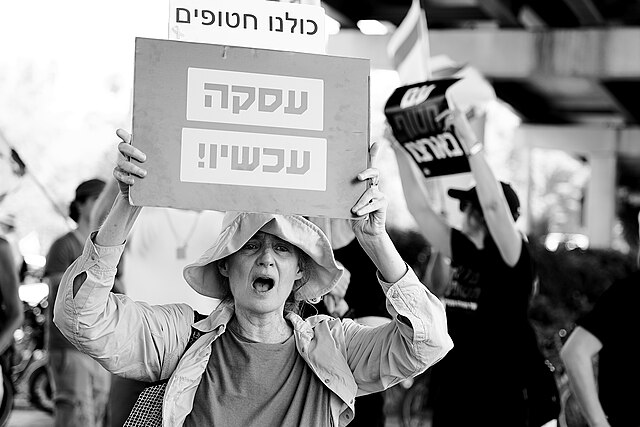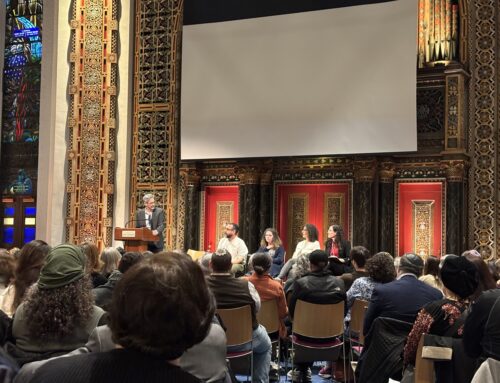INSIGHTS
Forever War
By Mark Gold
The first anniversary of the October 7 assault has come and gone. What has changed in that time is that now, Israelis are fighting actively on three fronts instead of just one. For all the tactical successes, security still eludes Israel. Bibi’s government has yet to articulate a program to end the war.
Yes, the Government says its war aims are to defeat Hamas and to bring home the hostages. These, however, are political slogans, not an actual program. For all the crushing blows, Hamas still fights. The IDF is currently engaged in intense combat in the north of Gaza, which the army had cleared of Hamas fighters early in the war. The IDF has no permanent control in the south either. Its forces raid various areas, shuffling Gazan refugees hither and yon with evacuation orders. To assert real control would require an occupation and Benny Gantz, the former IDF Chief of Staff and current opposition Knesset member and party leader, no longer with the government but close to army thinking, declared recently the army would need to have a presence in Gaza for years. Military reoccupation of Gaza, however, is not politically popular. Been there, done that. Still, Bibi’s government permitted a conference to be held in a field near the wreckage of kibbutz Be’eri on the Gaza border, where Netanyahu’s extreme right partners publicly planned a resettlement of Gaza. All this while the residents of the ruined communities along Israel’s southern border continue to be displaced. For them, there are no concrete plans. As for the hostages, the government has prepared no conference. It still has no plan to return them home. They hold a low position, at best, in the government’s muddled agenda.
To say that Hamas is an Iranian proxy is to be somewhat misleading. True, it was armed by Iran as part of a joint program of war with Israel. But Hamas has an independent agenda. It would perhaps be more accurate to say that Hamas is allied with Iran, and in its decision to wage war with Israel, it believed it would not act alone. With its attack, Hamas wanted to ignite a total war with Israel. In that, it has not yet succeeded. But Hamas’ allies have not been completely silent either. Hezbollah, the powerful Iranian-allied Shiite military force and social movement in Lebanon has been waging a low scale war with Israel since the start of the Gaza war, lobbing rockets into Israel’s northern communities nearly every day. Roughly a hundred thousand Israelis have been displaced from their homes. To end this low-level war decisively, Israel launched a series of well-planned attacks, including a ground invasion. It killed Hezbollah’s senior leadership and many of its mid-level commanders and occupied a small strip, several miles wide along the border, destroying tunnels and seizing weapons. At the beginning of the campaign, the IDF said it would need several weeks to bring security to Israel’s northern communities. Finally a cease-fire has been concluded but very few have returned home. . Southern Lebanon is a patchwork of Christian, Druze, Sunni, and Shiite communities. Forty years ago, Israel developed relationships within Christian villages during its futile occupation of Lebanon’s south. In the mainly Christian village of Aitou, an Israeli air attack targeted a building housing displaced persons, killing 21. With the burning of these victims, and countless other innocent civilians, Israel has burned relationships.
It is not an accident that the violence has not abated. A cease-fire in Gaza would bring considerable political risks to Bibi and his government. While fighting continues, there will be no IDF investigation into the security failures leading to the October 7 calamity. Moreover, Bibi’s extremist partners are using the war in Gaza to cover for a campaign of terror and displacement within the West Bank, and a program of political repression against critics, initially targeting Israeli-Palestinian citizens but lately expanding to include Jewish citizens as well. Bibi’s extremist partners will oppose efforts to end the war. Playing for time, Bibi hopes that the fortunes of a forever war will improve personal political fortunes as well. In this, Bibi has been assisted by Hamas which, despite the incredible suffering of Gaza residents, also remains intransigent, hoping that a wider war will yet erupt, with attendant global political pressures to isolate and weaken Israel.
Already, Hamas has achieved an important strategic goal. Sunni Arab states, upset by the Iranian program of arming Shiite proxies, until recently viewed Iran as their primary security threat and were willing to enter into security arrangements with Israel, which clearly had the military strength to counter Iran in the event of a wider war. Hamas’sOctober 7 attack was timed to disrupt a formal security agreement, nearly completed, between Israel and neighboring Sunni states, brokered, in part, by the US. The thousands of civilian deaths in Gaza have compelled a political and strategic rethinking among the Sunni states, which have recently revived diplomatic dialogues with Iran.
War may be politics by other means but ultimately, the politics of diplomacy are required to reclaim stability from the chaos and destruction of war. The US has been working tirelessly, but so far fruitlessly, to construct a diplomatic solution to address not only an immediate end to the violence but to construct a broader program to generate stability and security. A cease fire agreement would necessarily include a return of the remaining hostages. Then the US and Israel could try to use their leverage to introduce a Sunni armed security force to curb Hamas and provide the environment in which Gaza reconstruction could begin. Reconstruction will require enormous resources which only will be mobilized within a framework of security and peace. Properly crafted, a process paved by diplomacy could create the environment in which everyone sees their interests advanced by peace and mutual security arrangements.
The alternative is a forever war. If the result of this war is just a new generation of aggrieved and angry populations, for all the tactical IDF successes, the Gaza war will have been an enormous security failure.

Mark Gold is the treasurer of Partners for Progressive Israel.







Leave A Comment